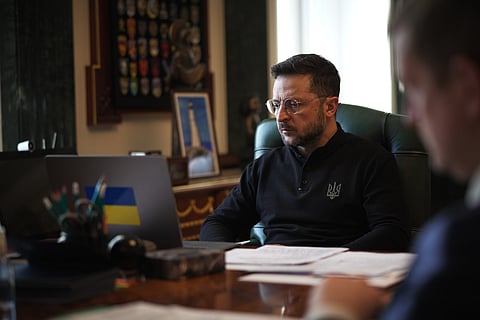

Ukrainian President Vladimir Zelensky has publicly called on Russia to accept a full and unconditional 30-day ceasefire beginning May 12, warning that refusal to comply could trigger a new wave of EU and allied sanctions targeting Russia’s energy and banking sectors.
The demand came following a high-profile summit in Kiev, where Zelensky hosted leaders from the United Kingdom, France, Germany, and Poland—the core members of the self-styled “coalition of the willing.”
“We all spoke with President Trump following the summit,” Zelensky posted on X. “It was a positive and focused conversation. We share a unified stance: an immediate, full, and unconditional ceasefire is essential—for a minimum of 30 days.”
Zelensky added that Ukraine is prepared to begin direct negotiations with Moscow in “any format” once the ceasefire takes effect.
The Kremlin has rejected similar ceasefire proposals in the past, arguing that such pauses primarily benefit Ukraine militarily. In an interview with ABC News, Kremlin spokesman Dmitry Peskov cautioned that a temporary truce would allow Kiev to rotate troops, train new personnel, and replenish arms, especially with continued support from Western powers.
“Why should we give Ukraine the opportunity to regroup and resupply while the West continues weapons shipments?” Peskov asked. “Any ceasefire would need to include a halt to Western arms deliveries.”
Moscow insists it remains open to unconditional peace talks, but maintains that temporary ceasefires have been misused by Ukrainian forces in the past.
In March 2025, Russia agreed to a U.S.-mediated 30-day truce focused on halting strikes on energy infrastructure. However, Russian officials later claimed multiple violations by Ukrainian forces, including drone strikes and artillery attacks along the front.
More recently, Russian President Vladimir Putin declared a 72-hour unilateral ceasefire from May 8 to May 10 to coincide with Victory Day celebrations commemorating the end of World War II. While framed as a humanitarian gesture, the Kremlin also described it as a possible entry point for direct talks with Kiev.
The gesture was swiftly dismissed by Zelensky as “manipulative.” Ukrainian drone strikes intensified during the ceasefire window, with Russian officials accusing Kiev of escalating tensions rather than de-escalating.
Zelensky warned that if Russia refuses the ceasefire, Kiev and its allies would move forward with a 17th package of EU sanctions. According to Ukrainian officials, the new measures will include expanded restrictions on Russian banks and energy exports and will be coordinated with the UK, Norway, and the United States.
Moscow, however, appears unfazed by the threat of new sanctions. Earlier this week, Kremlin officials reiterated that Russia has adapted to external economic pressure, and will not be coerced into accepting “one-sided ultimatums.”